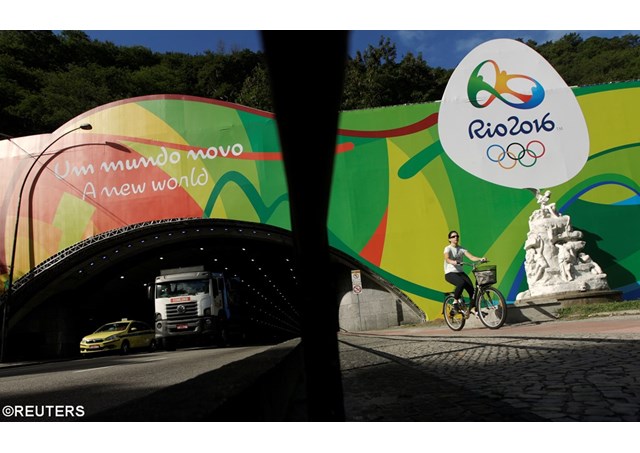
UN permanent observer gives statement on upcoming Olympics

(Vatican Radio) The promotion of human rights for everyone in the context of sports and the Olympic ideal was the theme of Tuesday’s statement by the permanent observer of the Holy See to the United Nations.
Archbishop Ivan Jurkovič delivered the statement to the 32nd Session of the Human Rights Council, in which he addressed the role of sports and the Olympics in promoting a “better international environment” that is “more inclusive and open to everyone.”
The archbishop also stressed the role of sports in promoting human rights among the international community.
In this context, he said the Holy See will be hosting a “Conference On Faith and Sport” later this year.
The Rio de Janeiro summer Olympics will run from 5-21 August.
Read the full statement below:
Statement by His Excellency Archbishop Ivan Jurkovič
Permanent Observer of the Holy See to the UN and Other International Organizations in Geneva
at the 32nd Session of the Human Rights Council
Panel on the Use of Sport and the Olympic Ideal to Promote Human Rights for All
28th June 2016
Mr. President,
The Holy See acknowledges the unique role of sport and the Olympic ideal as instruments to facilitate the building of a better international environment, more inclusive and open to everyone. In fact, this year, with the Olympic Games that will be held in Rio, we have an opportunity to appreciate better the part that sports should play in building a more “Human Rights” respectful international community. As a clear sign of the unceasing commitment of the Holy See in this matter, we are expected to host the “Conference On Faith and Sport” this October in the Vatican, which intends to put the phenomenon of sports in the broadest cultural and religious context of mankind.
In particular, my Delegation recognizes the importance of the value of the Olympic Charter as an instrument to fostering and implementing better Human Rights. As Pope Francis said: “[...]the Olympic Charter,…among its main principles, poses the centrality of the person, the harmonious development of humankind, the defense of human dignity, and also that of contributing ‘to building a peaceful and better world, without war or tension, by educating youth through sport practiced without discrimination of any kind... with a spirit of friendship, solidarity and fair play’(International Olympic Committee, Olympic Charter, n. 6).”
Today more than ever, we strongly believe that our world needs this “spirit of friendship and solidarity”, and that it must remain at the core of the Olympic expression with the aim of promoting “universality, characterized by fraternity and friendship among peoples, understanding and peace among nations, out of respect, tolerance and harmony of differences.”
In this context, it is important to stress the educational value of sport, in particular among the young and children. Every sporting event, and the Olympic Games above all, can serve as a powerful tool to show how fundamental it is to always improve ourselves. In sport as well as in everyday life, we aim to achieve success, avoiding being satisfied with mediocre results. On the other hand, good sportsmanship in moments of failure is a good training for the eventual challenges and failures in life. Therefore, the social and ethical value of sport, together with a healthy competition, should always be put at the center of every sport event.
Mr. President,
Unfortunately, nowadays, sport is too often associated with its economic aspect, excessive competitiveness, violence and the exclusion of those who are “not just the best.” To tackle this issue we should be “united and determined in challenging every distorted aspect that can intrude, recognizing it as a phenomenon opposed to the full development of the individual and to his enjoyment of life.” A full support to the values of the “Olympic Ideal” in every competition is the first commitment that every Member State has to take to maintain and strengthen the ethical principles of sports and, through them, foster respect for Human Rights.
To fortify the message of inclusiveness and non-discrimination spread by the Olympic ideal, as Resolution 31/23 recalls, it is of great importance to “implement new or strengthen existing programs that provide more opportunities and facilitate barrier-free access to sport for all, in particular for children and youth, persons with disabilities, and women and girls.”
In this respect, the Paralympic Games are an example of inclusiveness and a demonstration of how sport, also for persons with disabilities, is an opportunity to express oneself, each according to their talent sand their limitations.
Mr. President,
In conclusion, the Holy See welcomes the use of sport as a tool to create a more enabling environment for Human Rights and encourages the Member States, the International Olympic Committee and the International Paralympic Committee, to continue their efforts to promote the Olympic ideal all over the world and in every sport. Moreover, the Holy See encourages the practice of sports to build bridges between peoples, nations and continents as well as in the society and, as long as it is practiced with respect for human dignity, it is a strong tool to create a more inclusive global society.
| All the contents on this site are copyrighted ©. |


